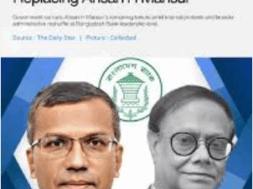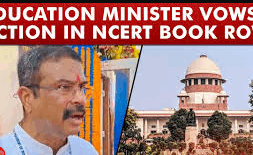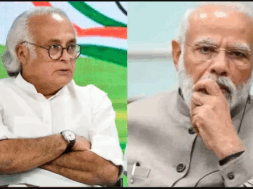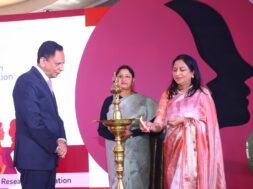
Manas Dasgupta
NEW DELHI, July 10: In a landmark judgement, the Supreme Court on Wednesday ruled that a divorced Muslim woman has as much right as women belonging to any other religion to seek alimony from her husband under Section 125 of the Code of Criminal Procedure – the law related to maintenance for wives.
A bench of Justice BV Nagarathna and Justice Augustine George Masih delivered the big judgement while dismissing the petition filed by a Muslim man challenging an order of the Telangana High Court which had upheld the local family court’s order and issued a direction to pay his wife maintenance after divorce. Justice Nagarathna and Justice Masih delivered separate, but concurrent, judgments.
“We are hereby dismissing the criminal appeal with the major conclusion that Section 125 of the erstwhile CrPC which deals with wife’s legal right to maintenance, would be applicable to all women and not just married women,” Justice Nagarathna said while pronouncing the verdict.
The Bench said maintenance is not charity but the right of married women and it is applicable to all married women irrespective of their religion and also covers Muslim women.
The landmark judgment has come on a petition by Mohd Abdul Samad, who was directed by a family court to pay a monthly allowance of ₹ 20,000 to his divorced wife. Mr Samad challenged the direction in Telangana High Court. The high court upheld the direction to pay maintenance, but modified the amount to ₹ 10,000. He then moved the Supreme Court. His counsel argued that divorced Muslim women can seek recourse to the Muslim Women (Protection of Rights on Divorce) Act, 1986 Act and stressed that it provides much more than what Section 125 CrPC does. He also argued that a special law — referring to the Act — shall prevail over a general law.
The Wednesday’s judgement came after the Supreme Court had decided to examine if a divorced Muslim woman was entitled to a claim of maintenance under Section 125 of the Criminal Procedure Code (CrPC) against her former husband — reigniting the debate on whether secular laws should be given precedence over distinct personal laws. On February 19, the bench had reserved its verdict in the case.
Section 125 broadly says a person with sufficient means cannot deny maintenance to their wife, children or parents. Maintenance is not a matter of charity but a fundamental right of married women, the court said. “This right transcends religious boundaries, reinforcing the principle of gender equality and financial security for all married women,” it added.
The court also observed that the time had come for the Indian men to recognise the indispensable role played by homemakers and the sacrifices they make for the family. Underlining the key role of homemakers in the family, the court said it was necessary for husbands to provide financial support to their wives.
Justice Nagarathna observed in her judgment that an Indian married man must become conscious of the fact that he would have to financially empower and provide for his wife, who does not have an independent source of income, by making available financial resources particularly towards her personal needs, “in other words, giving access to his financial resources.”
“Such financial empowerment would place such a vulnerable wife in a more secure position in the family. Those Indian married men who are conscious of this aspect and who make available their financial resources for their spouse towards their personal expenses, apart from household expenditure, possibly by having a joint bank account or via an ATM card, must be acknowledged,” she said in the order.
She added that the direction to provide maintenance seeks to alleviate the “financial stress and vulnerability of the impecunious woman who is dependent on her husband economically”. “It is indeed a constitutional imperative to redress the vulnerability of a married woman which includes a divorced woman who does not have an independent source of income under Section 125 of the CrPC. It is commonplace that married women sacrifice employment opportunities to nurture the family, pursue child rearing, and undertake care work for the elderly.”
The Supreme Court’s order stating that a Muslim woman is entitled to maintenance from her husband after divorce under Section 125 of the Code of Criminal Procedure underlined that maintenance was not charity but a fundamental right of married women. “This right transcends religious boundaries, reinforcing the principle of gender equality and financial security for all married women,” it said.
Section 125 broadly says a person with sufficient means cannot deny maintenance to their wife, children or parents. “Some husbands are not conscious of the fact that the wife, who is a homemaker, is dependent on them emotionally and in other ways. Time has come for Indian men to recognise the indispensable role and sacrifices made by housewives for the family.”
Rekha Sharma, chairperson of the National Commission for Women, has welcomed the judgment. “NCW Chairperson, Ms Rekha Sharma, wholeheartedly welcomes the Supreme Court’s landmark ruling affirming the right of Muslim women to seek maintenance under Section 125 of the CrPC. This decision is a significant step towards gender equality and justice for all women,” the panel said in a post on X.
Amicus Curiae Gaurav Agarwal countered that the personal law does not take away a woman’s entitlement to relief under the gender-neutral CrPC.
In this landmark verdict, the Supreme Court had ruled that Section 125 of CrPC applies to everyone, irrespective of their religion. This was, however, diluted by the Muslim Women (Protection of Rights on Divorce) Act, 1986, that stated that the Muslim woman can seek maintenance only during iddat — 90 days after the divorce.
In 2001, the Supreme Court upheld the Constitutional validity of the 1986 Act, but ruled that the obligation of a man to provide maintenance to his divorced wife extends till she remarries or is able to support herself. Today’s order further consolidates a divorced woman’s order to seek alimony under CrPC, irrespective of her religion.
The law governing maintenance for destitute wives, children, and parents has been codified under section 125 of CrPC that stipulates that if any person “having sufficient means neglects or refuses to maintain” his wife, then a magistrate of the first class may, upon proof of such neglect or refusal, order such a person to make a monthly allowance for the maintenance of his wife at a monthly rate as the magistrate thinks fit.
The explanation to this provision clarifies that a “wife” includes a woman who has been divorced by, or has obtained a divorce from, her husband and has not remarried. It does not specify anything about the woman’s religion. Many States have made region-specific amendments to the section to allow a ceiling on the maintenance amount the court can order.
The 1986 Act, on the other hand, is a religion-specific law that provides for a procedure for a Muslim woman to claim maintenance during divorce. It was enacted to essentially nullify the Supreme Court’s 1985 decision famously known as the Shah Bano case which upheld a Muslim woman’s right to seek maintenance from her divorced husband under Section 125 of the CrPC. The verdict was, however, perceived by many to be an affront to religious personal laws.
Section 3 of the 1986 Act guarantees the payment of maintenance to a divorced Muslim woman by her former husband only during the period of iddat — a period, usually of three months, which a woman must observe after the death of her husband or a divorce before she can remarry.














